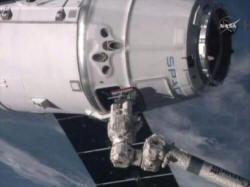|
 Commercial
space rides for U.S. astronauts to save millions: NASA Commercial
space rides for U.S. astronauts to save millions: NASA
 Send a link to a friend
Send a link to a friend
[January 27, 2015]
By Irene Klotz
CAPE CANAVERAL, Fla (Reuters) - The U.S.
space program should save more than $12 million a seat flying astronauts
to and from the International Space Station on commercial space taxis
rather than aboard Russian capsules, the NASA program manager said on
Monday.
|
|
 In September, the National Aeronautics and Space Administration
awarded contracts worth up to a combined $6.8 billion to Boeing and
privately owned Space Exploration Technologies, or SpaceX, to fly
crew to the station, a $100 billion research laboratory about 260
miles above Earth. In September, the National Aeronautics and Space Administration
awarded contracts worth up to a combined $6.8 billion to Boeing and
privately owned Space Exploration Technologies, or SpaceX, to fly
crew to the station, a $100 billion research laboratory about 260
miles above Earth.
Since retiring the space shuttles in 2011, the United States has
depended on Russia's space agency, Roscosmos, to ferry astronauts to
the orbital outpost. The service costs more than $70 million per
person.
NASA expects to pay an average of $58 million a seat when its
astronauts begin flying on Boeing’s CST-100 and SpaceX’s Dragon
capsules in 2017, Kathy Lueders, manager of NASA’s Commercial Crew
program, told reporters during a news conference in Houston and via
conference call.
 “I don’t ever want to have to write another check to Roscosmos after
2017, hopefully,” NASA Administrator Charles Bolden said.
Both SpaceX and Boeing plan two test flights to the station, the
first without a crew and the second with a combination of company
test pilots and NASA astronauts aboard.
SpaceX is targeting its unmanned test flight in 2016 and its piloted
flight in early 2017, said company president Gwynne Shotwell.
Boeing’s test flights are targeted for April and July 2017, vice
president and program manager John Elbon said.
[to top of second column] |

For its manned test flight, Boeing plans to fly one as-yet-unnamed
company astronaut and one NASA astronaut. SpaceX said it is still
deciding on a test flight crew.
Though schedules show SpaceX being ready ahead of Boeing to fly
operational missions, NASA currently expects Boeing to begin flight
services first in December 2017, Lueders said.
(Editing by David Gregorio)
[© 2014 Thomson Reuters. All rights
reserved.]
Copyright 2014 Reuters. All rights reserved. This material may not be published,
broadcast, rewritten or redistributed.
 |